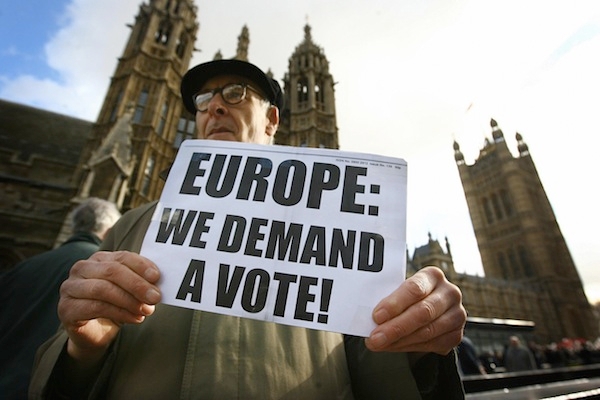James Wharton’s Private Member’s Bill has passed its second reading in the House of Commons by 304 votes to 0. The Labour Party’s decision to abstain on the vote, and Conservative backbenchers’ insistence that a vote be held does make the chamber look rather North Korean this afternoon. But what have we learned from just under five hours of debate? Tory HQ’s answer would be five neat points, all entitled ‘Only the Tories will Let Britain Decide’. In reality, the result of the debate wasn’t very interesting (aside from which Labour MPs backed the bill, on which more shortly), but there are still some useful lessons from the debate itself that are worth considering.
1. Only the Tories will Let Britain Decide… but that will probably soon change
As I blogged earlier, Douglas Alexander’s speech in the Commons was more about the dangers of an ‘Out’ vote than the intrinsic problem with a referendum. Even when he criticised the Tory plan for a referendum, it was so specific that he left plenty of room for him to be able to reverse Labour’s policy without his opponents being able to say ‘ah, but only recently you said a referendum was a bad idea!’ They will say that anyway. But it does appear that Alexander, the most cautious member of the Labour frontbench on this issue, is becoming mindful of a looming U-turn on European policy. As MPs voted in the Commons this afternoon, I caught sight of Alexander deep in conversation with William Hague. Perhaps he was asking for tips on how to U-turn on your previous referendum policy, which Hague knows all about.
Other Labour MPs seemed to feel the winds of change blowing in the Chamber, too. Ian Davidson, in one of the funniest (and for Martin Horwood, most offensive) speeches of the debate, told his colleagues that he suspected the party would change its position. He said:
‘The Labour party’s views on these matters is best described as being in a state of flux. It is a caterpillar, which, in a short time, will emerge as a butterfly. I believe that we will change our position in a relatively short time, as events change, because we are clearly heading for a crisis in the European Union.’
2. The Bill faces a rocky road
Forget the wrecking amendments that will be brought as it progresses, this legislation could be under threat from those who support a referendum. Even though Wharton was optimistic about the Bill’s chances when he spoke at the APPG for an EU referendum earlier this week, there were clear signs that eurosceptic Labour MPs want to have a go at amending it, regardless of whether their party’s leadership shifts position soon. Kate Hoey, Dennis Skinner and a number of other Labourites made clear in their speeches that they wanted to see a referendum before the General Election, but Hoey’s speech spelt out the danger for the legislation clearly. She said:
‘The Bill is not necessarily going to be the Bill that finally gets consent in this House, there will be amendments. I personally would like to see a referendum sooner rather than later.’
Why is this dangerous? As I explained earlier, it would mean that the Tory party could go into orbit. Remember that ‘europhile’ is the dirtiest word for many Conservative MPs and they always feel compelled to support any eurosceptic vote, even if it isn’t one they personally support. If a Labour MP tabled an amendment calling for a pre-2015 vote, even those who want renegotiation followed by a 2017 referendum would feel compelled to support it in case a vote against was misinterpreted by constituents, or wilfully misinterpreted by Ukip.
3. Tom Watson’s letter to Ed Miliband didn’t help the leader shake off his ‘weak’ image
Sure, the former party election co-ordinator made clear that he resigned of his own accord, but the Conservatives were thrilled with the reference to his ‘Buddha-like qualities of patience’, and brought it up in the Chamber. Douglas Alexander’s speech gave William Hague plenty of opportunity to expand on the ‘weak narrative’.
P.S. The six Labour MPs who voted for the bill were: Roger Godsiff, Kate Hoey, Kelvin Hopkins, Dennis Skinner, Graham Stringer , Gisela Stuart.







Comments